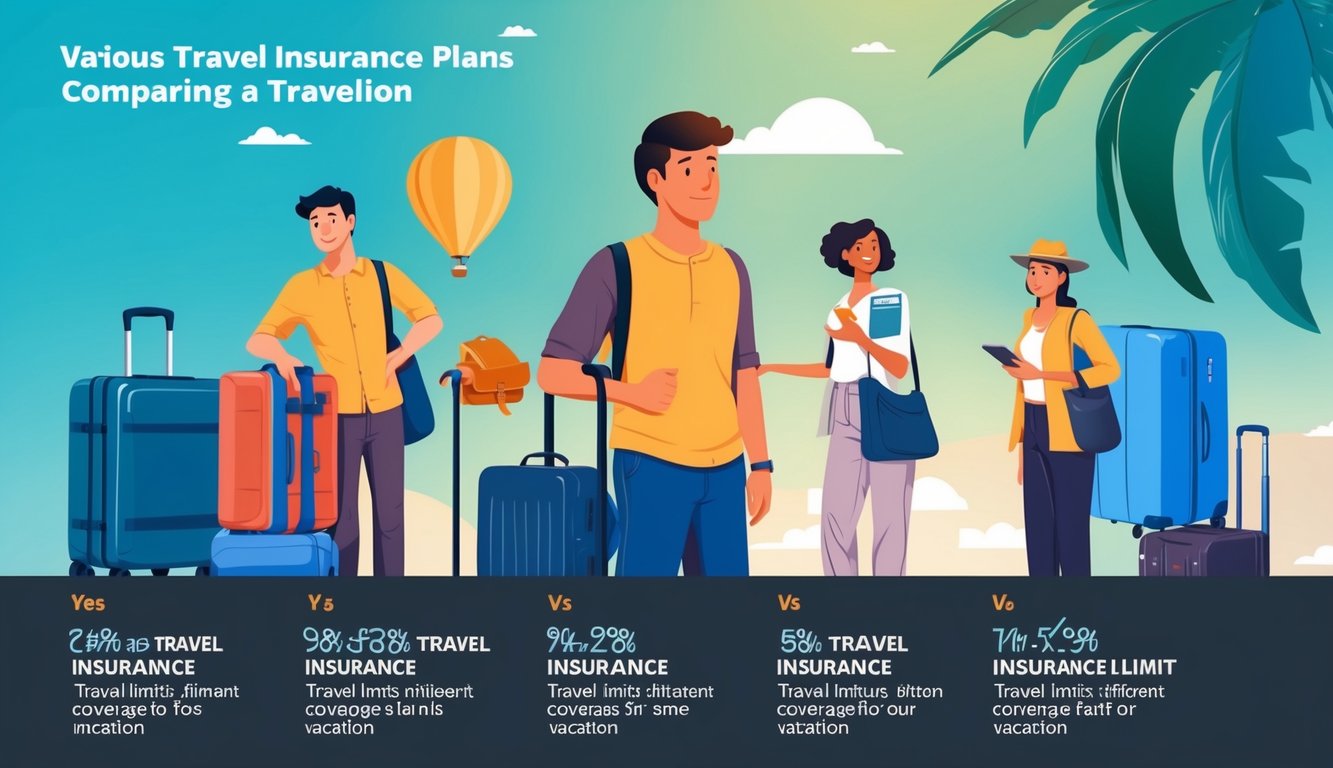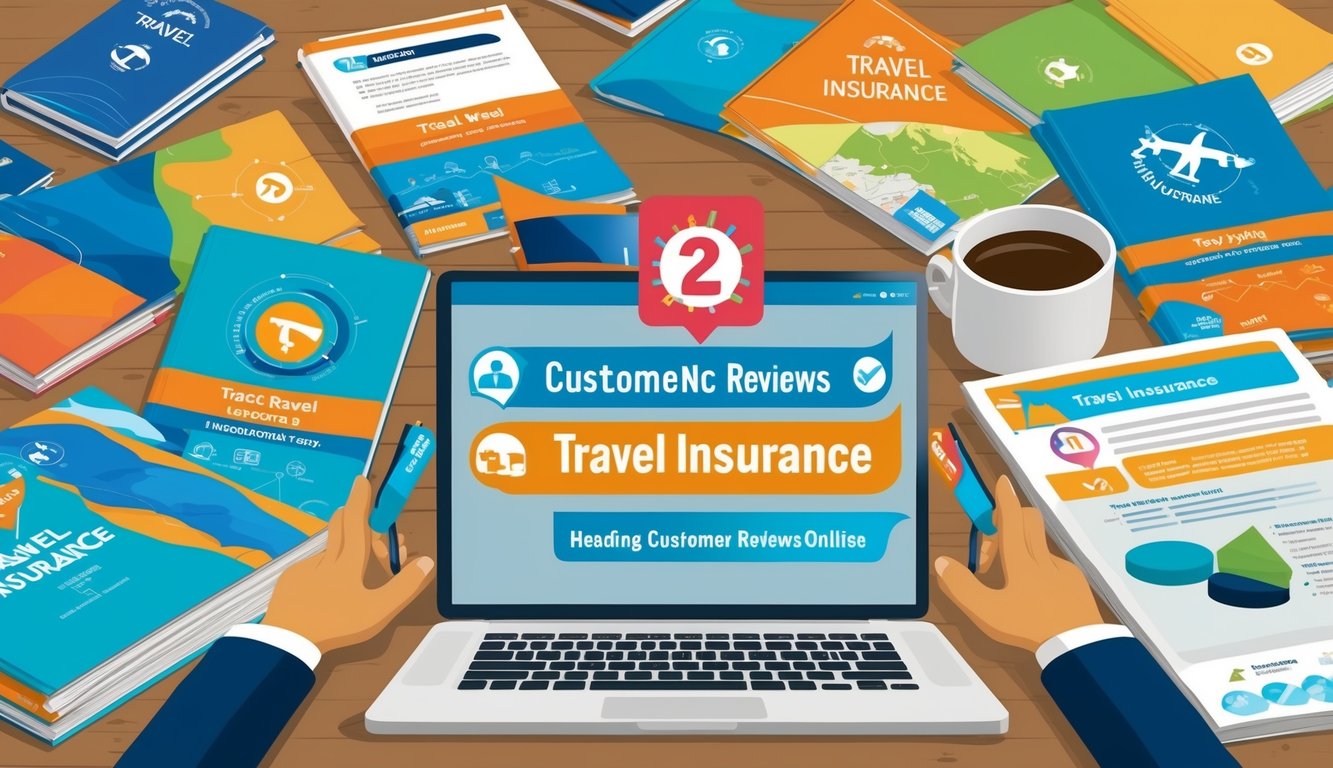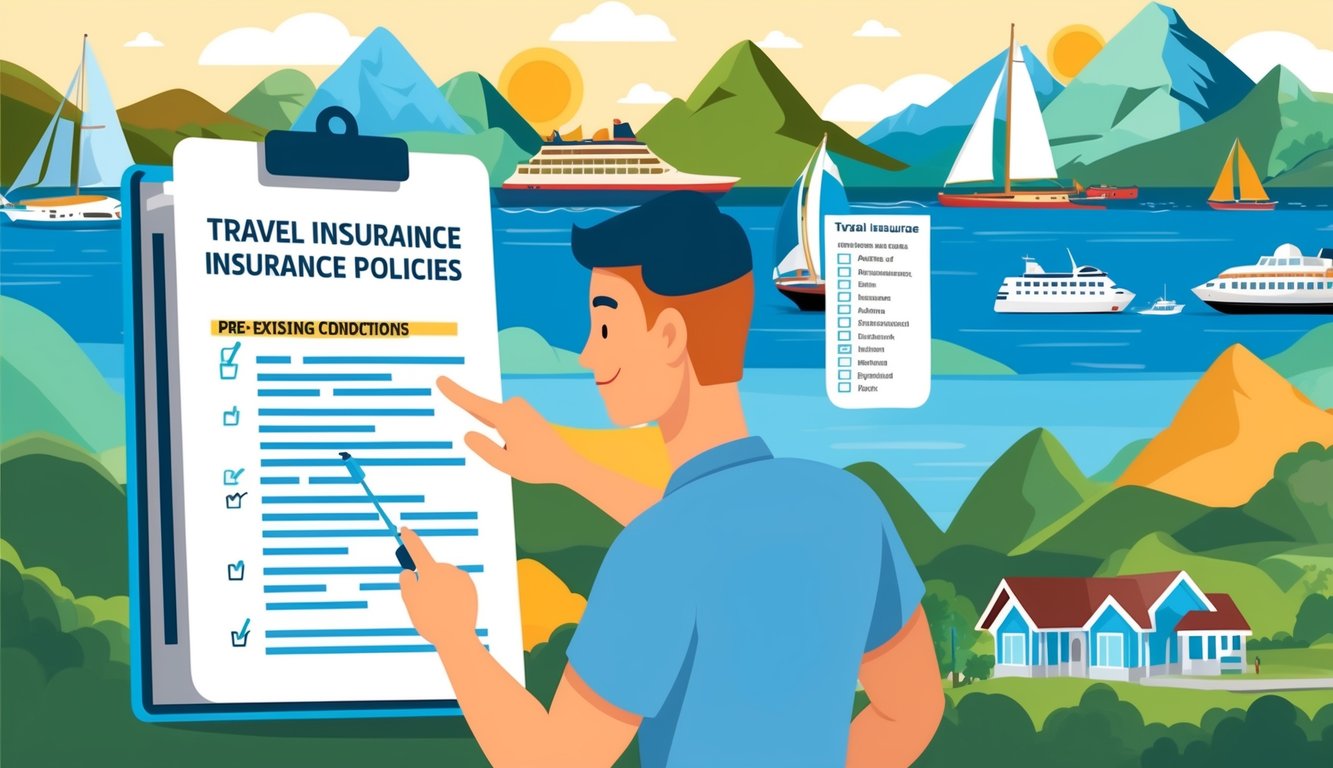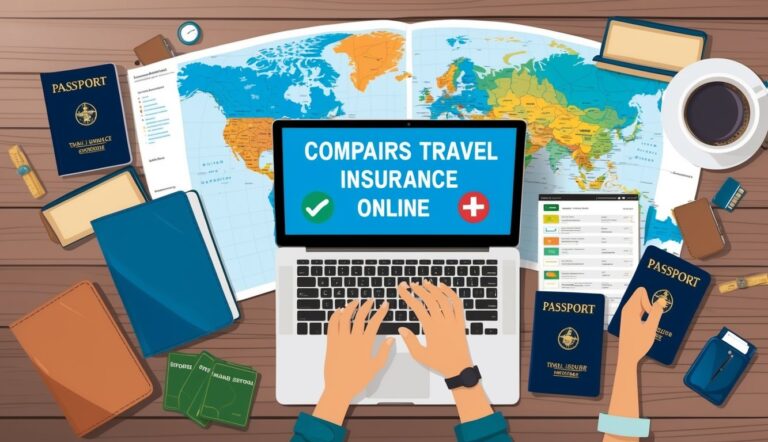Planning a vacation is exciting, but it’s crucial to consider the unexpected.
Travel insurance can provide peace of mind and financial protection against unforeseen events that may disrupt your trip.
From flight cancellations to medical emergencies abroad, having the right coverage can save you from significant stress and expenses.
Choosing the appropriate travel insurance for your vacation requires careful consideration of your specific needs and trip details. By understanding the types of coverage available and assessing your individual circumstances, you can select a policy that offers the best protection for your travel investment.
This guide will help you navigate the process of finding the right travel insurance for your next adventure.
1) Evaluate Coverage Options
When choosing travel insurance, it’s crucial to evaluate different coverage options.
Start by assessing your specific needs and trip details.
Consider medical coverage, which can protect you from expensive healthcare costs abroad.
Look for policies that offer adequate emergency medical coverage and evacuation benefits.
Trip cancellation and interruption coverage are important for protecting your financial investment.
These can reimburse you if you need to cancel or cut your trip short due to covered reasons.
Examine baggage protection options.
This coverage can help if your luggage is lost, damaged, or delayed during your travels.
Travel delay coverage can be valuable, especially for longer trips or those with multiple connections.
It can provide reimbursement for additional expenses if your travel is delayed.
Don’t overlook adventure sports coverage if you plan to participate in activities like skiing or scuba diving.
Standard policies may exclude these, so check if you need additional protection.
Compare policy limits and deductibles.
Higher limits generally offer more protection, while lower deductibles mean less out-of-pocket expense if you file a claim.
Read the fine print carefully.
Pay attention to exclusions and limitations to ensure you understand what is and isn’t covered under each policy option.
Consider whether you need additional coverage like rental car protection or identity theft assistance.
These can provide extra peace of mind depending on your travel plans.
2) Check Trip Interruption Benefits
Trip interruption coverage is a crucial component of travel insurance.
It provides reimbursement if you need to cut your trip short due to unforeseen circumstances.
When reviewing policies, look for trip interruption insurance that typically reimburses between 100% and 150% of your insured trip cost.
This extra cushion can cover additional expenses like last-minute flights home.
Pay attention to the dollar caps on trip interruption benefits.
Many policies set limits between $6,000 and $9,000.
Ensure this amount adequately covers your potential losses.
Consider what events are covered under trip interruption.
Common reasons include illness, injury, natural disasters, or travel advisories.
Read the policy details carefully to understand what qualifies for reimbursement.
Check if the policy covers transportation costs to return home or to rejoin your trip.
Some plans may also reimburse you for unused, prepaid expenses like hotel bookings or tour packages.
Trip interruption coverage is usually included in comprehensive travel insurance plans.
However, the extent of coverage can vary significantly between providers and policies.
Remember to compare multiple options before making a decision.
Each trip is unique, so choose a policy that best fits your specific travel plans and potential risks.
3) Understand Medical Coverage
Medical coverage is a crucial aspect of travel insurance.
It protects you from unexpected healthcare costs while abroad.
Before choosing a policy, carefully review the medical benefits offered.
Check the maximum coverage limit for medical expenses. GeoBlue offers plans with coverage up to $1 million, which can provide peace of mind for extensive medical needs.
Consider emergency medical evacuation coverage.
This can be vital if you need to be transported to a better-equipped facility or back home.
Some policies offer up to $1 million or more for emergency evacuations.
Look for coverage that includes pre-existing conditions if applicable.
Not all policies cover these, so it’s important to find one that does if you have ongoing health issues.
Pay attention to coverage for specific activities.
If you plan on participating in adventure sports or high-risk activities, ensure your policy covers related injuries.
Check if the policy offers 24/7 assistance services.
This can be invaluable when dealing with medical emergencies in unfamiliar locations or where language barriers exist.
Remember that your regular health insurance may not cover you abroad.
Travel insurance can fill this gap, ensuring you’re protected throughout your trip.
Lastly, review any exclusions or limitations in the policy.
Understanding what isn’t covered is just as important as knowing what is.
4) Compare Prices and Plans
When choosing travel insurance, it’s crucial to compare different plans and prices.
Start by obtaining quotes from multiple providers to get a sense of the market rates.
Look for comprehensive coverage options that include emergency medical care, trip cancellation, and baggage protection.
These are typically the most important features for most travelers.
Pay attention to coverage limits and deductibles.
Higher limits may cost more but provide better protection.
Lower deductibles mean you’ll pay less out-of-pocket if you need to make a claim.
Consider your specific needs.
If you’re planning adventure activities, ensure the policy covers them.
For international trips, check that the plan includes adequate medical evacuation coverage.
Don’t automatically choose the cheapest option.
Balance cost with coverage to find the best value.
Sometimes paying a bit more can provide significantly better protection.
Read the fine print carefully.
Look for exclusions and limitations that might affect your coverage.
Pay particular attention to pre-existing condition clauses and cancellation reasons.
Check if the policy offers 24/7 emergency assistance.
This can be invaluable if you encounter problems during your trip.
Consider annual policies if you travel frequently.
These can be more cost-effective than buying separate policies for each trip.
Remember that prices can vary based on factors like your age, destination, and trip length.
Get personalized quotes for the most accurate pricing.
5) Look for Coverage Limits

When selecting travel insurance, it’s crucial to examine the coverage limits for each benefit.
These limits determine the maximum amount the policy will pay out for specific events or expenses.
Pay close attention to the limits for medical coverage. Emergency medical and medical evacuation coverage limits can vary widely between policies.
Ensure these limits are sufficient for your destination and personal health needs.
Check the trip cancellation and interruption limits as well.
These should ideally cover the full cost of your trip.
Some policies offer up to $15,000 per person for trip cancellation or interruption.
Don’t forget to review limits for baggage loss or delay.
These can range from a few hundred to several thousand dollars.
Consider the value of your belongings when assessing if the coverage is adequate.
Rental car coverage limits are also important if you plan to rent a vehicle during your trip.
Make sure the limit is enough to cover potential damages or theft.
Remember that higher coverage limits often come with higher premiums.
Balance your need for protection with your budget when making your decision.
6) Read Customer Reviews

Customer reviews provide valuable insights into real-world experiences with travel insurance providers.
Take time to read reviews from multiple sources to get a balanced perspective.
Look for reviews that discuss claim processing, customer service responsiveness, and overall satisfaction.
Pay attention to both positive and negative feedback to understand potential strengths and weaknesses of each insurer.
Consider the context of each review.
Some complaints may be due to misunderstandings of policy terms rather than poor service.
Look for patterns in feedback rather than focusing on isolated incidents.
Check reviews on reputable travel insurance comparison sites and consumer review platforms.
These often offer more detailed and objective assessments than testimonials on company websites.
Be wary of reviews that seem overly positive or negative without specific details.
Genuine reviews typically include concrete examples of the reviewer’s experience.
Don’t neglect to read reviews about the claims process.
This information can be crucial in understanding how an insurer handles emergencies and reimbursements.
Remember that while reviews are helpful, they should be just one factor in your decision-making process.
Combine this information with policy details, coverage options, and pricing to make an informed choice for your travel insurance needs.
7) Check for Pre-existing Condition Exclusions

When selecting travel insurance, it’s crucial to consider pre-existing medical conditions.
Many policies exclude coverage for these conditions, which can leave you vulnerable if you need medical care during your trip.
A pre-existing condition is typically defined as any medical issue you’ve had symptoms of or treatment for within a specific time frame before purchasing the policy.
This period usually ranges from 60 days to 6 months, depending on the insurer.
To protect yourself, look for policies that offer a pre-existing condition exclusion waiver.
This waiver extends your coverage to include pre-existing conditions, giving you peace of mind while traveling.
Be aware that to qualify for this waiver, you may need to insure 100% of your prepaid, non-refundable trip costs.
You’ll also likely need to purchase the policy within a set timeframe after making your initial trip deposit.
Some insurers, like Allianz Global Assistance, offer plans specifically designed for travelers with pre-existing conditions.
Their OneTrip Prime Plan is noted for its comprehensive coverage in this area.
Remember to disclose all relevant medical information when applying for travel insurance.
Honesty is essential to ensure you’re fully covered and to avoid potential claim denials later.
8) Verify Emergency Assistance Services

When choosing travel insurance, it’s crucial to examine the emergency assistance services offered.
These services can be invaluable if you encounter unexpected problems during your trip.
Look for plans that provide 24/7 emergency support.
This ensures you can get help at any time, regardless of your location or time zone.
Check if the insurance company offers a dedicated hotline for emergencies.
This direct line of communication can be essential when you need immediate assistance.
Verify that the plan includes medical evacuation coverage.
This service can be life-saving if you require transportation to a suitable medical facility in case of a serious illness or injury.
Consider policies that offer travel assistance services.
These may include help with lost passports, emergency cash transfers, or legal referrals in foreign countries.
Review the policy’s language translation services.
If you’re traveling to a country where you don’t speak the language, this can be incredibly helpful during emergencies.
Ensure the plan covers emergency medical consultations.
Some insurers provide access to medical professionals who can offer advice over the phone.
Check if the policy includes assistance with emergency travel arrangements.
This can be crucial if you need to return home quickly due to unforeseen circumstances.
Look for coverage that includes emergency assistance for lost luggage.
This service can help track down your belongings or provide essentials if your bags are delayed.
9) Consider Your Destination’s Risks

When choosing travel insurance, it’s crucial to assess the specific risks associated with your destination.
Different locations present varying challenges and potential issues.
If you’re traveling to a remote area with limited medical facilities, prioritize plans with robust emergency medical coverage.
Look for policies that offer high limits for medical expenses and evacuation.
For destinations prone to natural disasters, ensure your policy includes coverage for trip cancellation or interruption due to weather-related events.
This can protect your investment if unforeseen circumstances force you to change your plans.
If you’re visiting a country with political instability, check if your insurance covers evacuation for non-medical reasons.
Some policies offer this protection in case of civil unrest or other safety concerns.
Consider the activities you plan to engage in at your destination.
If you’re planning adventure sports or high-risk activities, verify that your policy covers these specifically.
Many standard plans exclude extreme sports or require additional coverage.
For trips to areas with high crime rates, look for policies that offer good coverage for theft or loss of personal belongings.
Pay attention to the limits and any special conditions for valuable items.
Lastly, check if your destination has any specific insurance requirements for entry.
Some countries mandate a minimum level of medical coverage for visitors.
Ensure your chosen policy meets these criteria to avoid issues upon arrival.
10) Review Policy Exclusions

When selecting travel insurance, it’s crucial to carefully review the policy exclusions.
These are specific situations or circumstances where your insurance won’t provide coverage.
Common exclusions often include pre-existing medical conditions.
If you have a health issue that existed before purchasing the policy, it might not be covered.
Many policies don’t cover injuries resulting from high-risk activities like skydiving or bungee jumping.
Be sure to check if your planned activities are excluded.
Some insurers won’t cover losses due to war, civil unrest, or terrorism in certain regions.
If you’re traveling to an area with potential political instability, verify your coverage.
Natural disasters can sometimes be excluded, especially if you purchase insurance after a storm or event has been forecast.
Alcohol and drug-related incidents are typically not covered.
Be aware that if you’re injured while under the influence, your claim may be denied.
Check for exclusions related to mental health issues.
Some policies may not cover treatment or trip cancellations due to anxiety or depression.
Travel insurance often excludes coverage for lost or stolen cash.
Make sure you understand what types of financial losses are protected.
Carefully read the fine print regarding baggage coverage.
Certain valuable items like jewelry or electronics may have limited coverage or be excluded entirely.
Understanding Travel Insurance
Travel insurance provides financial protection and assistance for various travel-related risks and issues.
It offers peace of mind by covering unexpected events that could disrupt your trip or cause financial loss.
What is Travel Insurance?
Travel insurance is a type of coverage designed to protect you from financial losses and provide assistance during your travels.
It can cover a wide range of situations, from trip cancellations to medical emergencies abroad.
Key benefits of travel insurance include:
- Reimbursement for cancelled or interrupted trips
- Coverage for lost, stolen, or damaged luggage
- Emergency medical coverage and evacuation
- 24/7 assistance services
You can purchase travel insurance for single trips or opt for annual plans if you travel frequently.
The cost typically ranges from 4% to 10% of your total trip cost, depending on factors like your age, destination, and coverage level.
Types of Travel Insurance Policies
Travel insurance comes in various forms to suit different needs and trip types.
Some common policy types include:
-
Comprehensive plans: These offer the most extensive coverage, including trip cancellation, medical emergencies, and baggage loss.
-
Medical-only plans: Focused on covering health-related issues during your trip.
-
Trip cancellation insurance: Reimburses you if you need to cancel your trip for covered reasons.
-
Adventure sports coverage: Designed for travelers engaging in high-risk activities.
-
Annual multi-trip plans: Ideal for frequent travelers, covering multiple trips within a year.
Common Terms and Definitions
Understanding travel insurance terminology helps you make informed decisions when choosing a policy.
Here are some key terms:
- Premium: The amount you pay for the insurance policy.
- Deductible: The amount you must pay out-of-pocket before your coverage kicks in.
- Exclusions: Situations or events not covered by your policy.
- Pre-existing conditions: Medical conditions you had before purchasing the insurance.
- Trip interruption: Coverage for unexpected events that cut your trip short.
- Travel delay: Reimbursement for expenses incurred due to trip delays.
Always read the fine print of your policy to understand the specific terms, conditions, and coverage limits.
This ensures you choose the right travel insurance for your needs and avoid surprises when filing a claim.
Assessing Your Travel Needs
Choosing the right travel insurance starts with a thorough evaluation of your specific circumstances and trip details.
Your health status, destination risks, and travel duration all play crucial roles in determining the most suitable coverage.
Evaluating Your Health and Medical History
Take stock of your current health conditions and any pre-existing medical issues.
These factors will significantly influence the type of coverage you need. Check if COVID-19 emergencies are covered in potential policies.
Consider your age and physical fitness level.
Older travelers or those with chronic conditions may require more comprehensive medical coverage.
Review your regular health insurance policy.
Understand what it covers abroad and identify any gaps that travel insurance should fill.
Make a list of medications you take regularly.
Ensure your travel insurance covers prescription replacements if lost or stolen during your trip.
Considering Your Travel Destinations
Research the healthcare systems and potential risks in your destination countries.
Some locations may require higher coverage limits due to expensive medical care.
Check for travel advisories or warnings for your planned destinations. Look for policies that cover cancellations due to unforeseen events or emergencies in your target locations.
Consider the activities you’ll engage in.
Adventure sports or high-risk activities may require additional coverage or specialized policies.
Evaluate the political stability and natural disaster risks of your destinations.
Ensure your policy includes evacuation coverage if needed.
Duration and Frequency of Travel
Determine the length of your trip.
Longer journeys may benefit from more comprehensive coverage or multi-trip insurance plans.
Consider your travel frequency.
If you take multiple trips per year, an annual policy might be more cost-effective than individual trip coverage.
Factor in any extended stays or work-related activities.
Some policies have duration limits or exclusions for certain types of travel.
Review cancellation and interruption coverage.
Ensure the policy limits align with your total trip costs and potential losses if you need to cut your journey short.
Comparing Insurance Providers
Selecting the right travel insurance requires careful evaluation of providers.
Key factors to consider include the company’s reputation, coverage details, and overall value for the price.
Reputation and Reviews
Start by researching the reputation of travel insurance companies.
Look for providers with high ratings from reputable sources like NerdWallet or Forbes Advisor.
Check customer reviews on independent websites to gauge satisfaction levels.
Pay attention to:
- Customer service responsiveness
- Claim processing efficiency
- Overall reliability
Consider how long the company has been in business.
Established insurers often have more experience handling claims and navigating complex situations.
Coverage Limits and Exclusions
Carefully examine the coverage limits and exclusions of each policy.
Compare maximum payouts for medical emergencies, trip cancellations, and lost baggage.
Key areas to evaluate:
- Emergency medical coverage
- Medical evacuation limits
- Trip cancellation/interruption benefits
- Baggage loss/delay compensation
Look for policies that align with your specific travel needs.
If you’re planning adventure activities, ensure they’re not excluded.
Pre-existing condition coverage may be crucial for some travelers.
Price Versus Value
Don’t simply choose the cheapest option. Compare the value offered by different policies relative to their cost.
A slightly more expensive plan might provide significantly better coverage.
Consider:
- Comprehensive coverage vs. basic plans
- Add-ons for specific needs (e.g., rental car protection)
- Multi-trip policies for frequent travelers
Look for providers offering flexible options.
Some insurers allow you to customize coverage, potentially saving money by excluding unnecessary benefits.
Remember, the goal is to find a balance between adequate protection and affordable premiums.
Your ideal policy should provide peace of mind without breaking the bank.
Additional Considerations
When selecting travel insurance, it’s crucial to pay attention to the details and understand the claims process.
These factors can significantly impact your coverage and ability to receive compensation if needed.
Reading the Fine Print
Carefully review the policy documents before purchasing travel insurance.
Look for exclusions and limitations that may affect your coverage.
Pay special attention to pre-existing medical condition clauses and adventure activity restrictions.
Check the coverage limits for each benefit category.
Ensure they align with your needs and the potential costs you might incur during your trip.
Compare different policies to find the best fit for your specific situation.
Be aware of time-sensitive benefits, such as cancel for any reason coverage.
These often require purchase within a certain timeframe after booking your trip.
Making a Claim
Before your trip, familiarize yourself with the claims process.
Keep all necessary documentation, including receipts, medical reports, and police reports if applicable.
If you need to make a claim, contact your insurance provider as soon as possible.
Many companies have 24/7 assistance hotlines to guide you through the process.
Follow the claim filing instructions carefully.
Submit all required forms and supporting documents promptly to avoid delays.
Be prepared for potential claim denials.
If your claim is rejected, review the reason and consider appealing if you believe it was wrongly denied.






